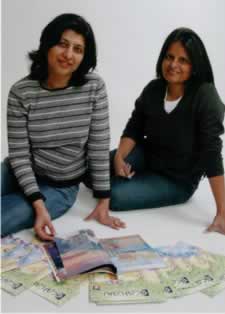It’s strange how very different lives get entwined and bring forth new creations. For many years, Monika Jain, who worked as a reporter for the Associated Press in Tokyo, had an idea unfolding in her sub-conscious: a literary magazine for South Asian children. The idea lingered even as she joined PBS as a field producer in California and then moved to New York to produce a documentary series for Japan’s NHK television. Leena Chawla, a management consultant in Boston who worked for CSC Index and Waite & Company for clients like Merrill Lynch, Morgan Stanley and Chase Manhattan Bank, was looking to do something different as the mother of two young children. She decided to start a play group and the two mothers who turned up with their kids were Jain and Radhika Ramdev, a graphic artist. They discussed the need for a children’s magazine and felt the excitement mounting. “It was spontaneous combustion,” recalls Jain. “My daughter Sejal was the inspiration behind the idea the books in the library were not reflective of her reality at all. She would come home asking when would we celebrate Passover!” Adds Chawla, “It really resonated with me, because I have a 7-year-old growing up in this country and there are just three brown children in the entire school. She never says that she feels different, but it comes across sometime.” The playgroup quickly transformed into a brand new business with the kids running around the laptops and Kahani was born. All the stories star South Asian children with names like Ravi and Ahmed and weave stories of growing up in America with columns on science, history and culture, so that their home countries are not some far away mirage, but a part of their lives. The partners started with their own seed money and don’t take any salaries. All the talented writers and illustrators who write for Kahani don’t take a penny and even the accountant works for free. Something about the need for such a product touches a chord with everyone. The magazine carries no ads and has no budget for marketing budget, drawing subscriptions continue from its website (www.kahani.com). “The marketing team is the parents who love the magazine and be it in Atlanta or California they pass the word around,” says Jain. Says Chawla, the stories reflect the realities of these children’s lives: “They are still American children and they have these two cultures that they are juggling. They now have the support that comes from knowing that there are others like them out there” |
The Storytellers Of Boston
